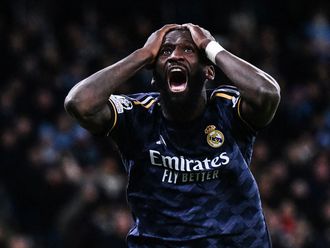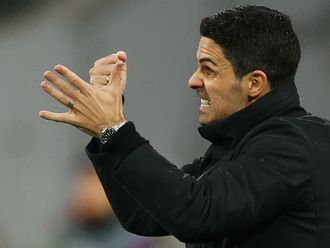Rome: Slowly, reluctantly, their voices hoarse and their shoulders slumped, Roma’s fans started to lift themselves from their seats and head toward the Stadio Olimpico exits, ready to make the long, sorrowful journey back into town.
Only a minute remained of the second leg of this Champions League semi-final, 60 more seconds after three frantic, chaotic, lunatic hours of soccer over two games. Liverpool still, somehow, led by 7-5 on aggregate. Roma needed to score twice more simply to force extra time.
At last, Roma’s fans resigned themselves to the inevitable. It was over. It would be Liverpool in the Champions League final for the first time in 11 years, against Real Madrid in Kiev, Ukraine, on May 26. Roma’s time had run out.
Then Cengiz Under, a Roma substitute still fizzing with energy, burst into Liverpool’s box once more. The ball careered into the hand of Liverpool defender Ragnar Klavan. Damir Skomina, the referee, awarded a penalty. The drift stopped, and watched. Radja Nainggolan scored. There was a glimmer: One goal would do it now. On the field, Roma’s players pleaded with Skomina to add on more time, not to cut them short. In the stands, they roared.
That moment, more than any other, summed up a semi-final that veered between mesmerising and madcap.
This was a semi-final, after all, that was over after little more than an hour of the first leg: when Liverpool were flying, 5-0 up, sweeping into the final, an unstoppable force. And yet, somehow, it was also a contest that, with just a few seconds remaining before Skomina finally blew his whistle and confirmed Liverpool’s return to the grandest game in club football, hung entirely in the balance.
That says something about Roma, of course: about how Eusebio Di Francesco’s team managed to salvage something from the ruins of Anfield last week, scrambling for two late goals to restore some pride and ignite some hope; about how they fulfilled his demand to “send a message” with their performance in the second leg; about how they refused to yield when Sadio Mane put Liverpool ahead in the first 10 minutes here, and then again when Georginio Wijnaldum made it 2-1 25 minutes in.
They are a team that deserved the rapturous ovation they were awarded by their fans at the end, a team that produced a miracle to qualify for the semi-final against Barcelona and always believed, deep down, that they were capable of repeating the trick. They are a team that earned Klopp’s sincere admiration for their courage, one that first drew level and then, when all seemed lost, rallied again, and brought Liverpool to the brink.
It says something about Liverpool, too, about their addiction to drama, their compulsion to live life on the edge, their determination to crest and fall with the waves of their own emotion: the strengths that make them such a force at their best and the weaknesses that make them so vulnerable when they are not. This is a team that can win 5-2 and feel like they have been beaten, and a team that can lose 4-2 and feel like they has triumphed, all in the space of eight days.










